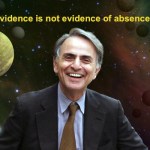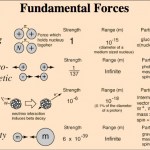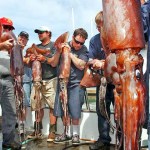Hypothesis
"Never waste your time trying to explain who you are to people who are committed to misunderstanding you." -Dream Hampton
Perhaps no word in the English language generates as much misunderstanding as the word theory. In scientific circles, this word has a very specific meaning that's different from everyday use, and -- as a theoretical astrophysicist myself -- I feel it's my duty to help explain exactly what we mean when we use it. In this week’s Ask Ethan column, I'm pleased to pull out of our question/suggestion box the question of Ripley, who asks:
I often see that…
"Even if there is only one possible unified theory, it is just a set of rules and equations. What is it that breathes fire into the equations and makes a universe for them to describe?" -Stephen Hawking
After a long search spanning more than my entire lifetime (so far), the Higgs boson has finally been discovered at both detectors -- CMS and ATLAS -- at the Large Hadron Collider at CERN.
Image credit: CERN / Particle Physics for Scottish Schools.
For a little more on this, check out the earlier posts here celebrating Higgs week:
The Biggest Firework of them all: The Higgs
How the…
After judging the science fair last week, I would like to revisit my tips for you the science fair participant.
Warning number 1
Some of the things I say here might go against what your teacher has told you. I am not sure what you should do in this case. Your teacher gives you a grade and I am just some dude on the internet. Proceed at your own risk.
Oh, and maybe you are a teacher. I think that is great that you are seeking more tips for your students. However, note that I have not read any science fair rules. I am merely thinking about science fair projects from a science viewpoint.…
The blue-haired head south to La Jolla shores in the winter while the summertime is prone to a different migration. Jumbo Humboldt squid now make their way north. This weekend, San Diego's coast has been swarmed by schools of the 5-foot squid, which have upset divers and local beach goers. There is no mention in the recent articles of the reasons for the squid invasion -- likely a result of overfishing and warmer waters. But there was a nice example of the strong commodification of marine life with this article at the Huffington Post, which included in its title the phrase: Carnivorous…
In a world where the temptation to lie, deceive and cheat is both strong and profitable, what compels some people to choose the straight and narrow path? According to a new brain-scanning study, honest moral decisions depend more on the absence of temptation in the first place than on people wilfully resisting these lures.
Joshua Greene and Joseph Paxton and Harvard University came to this conclusion by using a technique called functional magnetic resonance imaging (fMRI) to study the brain activity of people who were given a chance to lie. The volunteers were trying to predict the outcomes…
This is a headline I can easily imagine will appear in the next decade or so.
As skyscrapers replace skylines and concrete replaces trees, I believe art is going to play an ever-greater role in society.
We know that nature has psychological benefits. Studies show that spending time in natural environments can 1) reduce stress and 2) focus attention (hence all the hoods in the woods programs). There is no doubt that art also has similar benefits*.
It is not just that film, theatre, and paintings are an urban phenomenon. They are an urban phenomenon in part because the urban environment…
I have been meaning to write about this for quite some time. Really, I wanted to reply to Chad's article on science at Uncertain Principles, but you know how things go. So, here are my key and interesting points about science in random order.
Science is all about models (not ball bearings)
Science is about making models. What is a model? A model can be lots of things. It can be a mathematical relationship, a conceptual model, or even a physical model. One model I like to use is static friction. For many cases, the frictional force can be modeled as:
This model says the frictional…
I just got back from judging elementary level science fair (this is like kids in 6th grade or something). Here are some quick notes in no particular order.
Please, please do not have a 20 item list of supplies that you used on your board including things like thumb tacks, tape, paper and poster board. And then please do not read this list aloud during your presentation. I know you are nervous, I feel for you. Maybe you are trying to fill up time - maybe you think a long presentation is a good one. However, don't do it. Stick to the important stuff. If you need to fill up space on your…
Previously, I talked about science fairs. One of the problems is that students don't really have a good understanding of data analysis. For me, statistical analysis is just something to do with data. It isn't absolutely true. So, it doesn't really matter that students use sophisticated tests on their data. The important point is they use some type of test to compare data.
I just made up some arbitrary data analysis rules. Maybe if students and judges accept something like this, it could really improve science fair projects and judging.
To explain my analysis, I decided to have my own…
Over the past few months, I have been asked a number of questions about String Theory and the Universe, including from readers Benhead and Mastery Mistery. But now Jamie, whom I'm going to marry later this year, has been asking me about it, and so it's time to write something about the scientific topic of String Theory. (Send in your questions now, because I'll answer them all this week if there's enough interest.) Let's start with this pair of questions:
String theory has been around for over 20 years, and so far, there is not one shred of experimental or observational evidence in support of…
I was thinking about the timeline that brought us here, today, from the origin of the Universe up through the present day. I realized that the most uncertain thing that we know of, the step that we have the least information about, is the origin of life on Earth. All hypotheses about how life on Earth originated fall into three categories:
Abiogenesis, or the idea that life came from non-life, somehow, on Earth.
Life originated elsewhere in the Universe, and was brought to Earth, where it now thrives (e.g., panspermia, or exogenesis).
Life was created or designed by an outside force/being…




